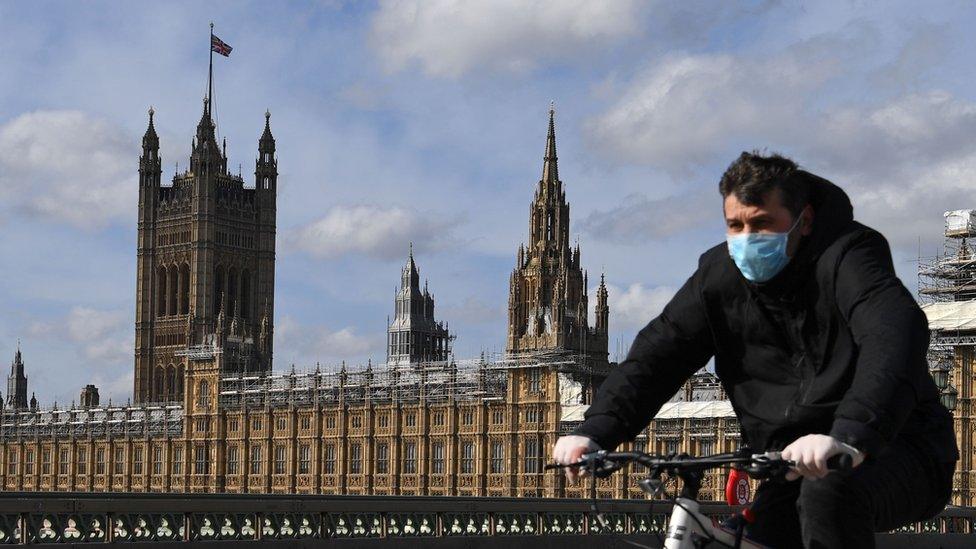Coronavirus: Speaker outlines plans for 'virtual' Parliament
- Published

MPs could take part in PMQs, urgent questions and statements via video link when they return to Parliament after recess.
In a letter to MPs, Commons Speaker Sir Lindsay Hoyle says plans for a virtual parliament are progressing well.
The main proposal would see some proceedings take place through video link, and broadcast live.
Parliament is due to return on 21 April to debate the coronavirus outbreak and other matters.
In his letter, Sir Lindsay said, given the scale of the challenge, that there would be "bumps along the way".
"But once these proceedings have been judged to be delivered in a satisfactory and sustainable way, both from a technological and participatory point of view, then the House can consider extending the model to other proceedings such as debates on motions and consideration of legislation."
He said: "I recognise the urgent need to put new arrangements in place and will do everything I can to ensure the House is presented with the opportunity to take a decision on this matter sooner rather than later."
The House of Commons Commission, external will discuss the plans at a meeting on Thursday.
It is understood that the committee - which is responsible for the administration and services of the House of Commons - is highly likely to nod through some changes.
MPs would then have to approve the changes the following week.
The prime minister was discharged from hospital on Sunday night, after spending three nights in intensive care to receive treatment for coronavirus.
Downing Street said the PM will not return to work immediately, and would continue his recovery at his country residence, Chequers.


MPs have been grappling with how to keep Parliament running during this crisis.
For obvious reasons, they don't want to be travelling around the country and sitting in a tightly packed chamber. But they do want to continue with scrutiny of what the government is doing.
The Commons Commission is highly likely to approve some changes on Thursday - allowing MPs to contribute to departmental questions and statements remotely.
A more controversial question is remote voting. Some in Parliament have concerns on issues like security. It seems less likely a speedy decision will be made on that, although I understand Commons Leader Jacob Rees Mogg is prepared to explore all options and most MPs acknowledge traipsing through packed lobbies can't continue while social distancing is in place.
The changes are a response to a very specific crisis. But many have been calling on Parliament to modernise for years and are hoping that these measures prove to allow more flexibility in the long-term.

Commons authorities are also considering ways in which MPs could vote remotely.
It is understood the government is prepared to consider all options to ensure Parliament continues to function.
Commons leader Jacob Rees-Mogg said last week that when MPs return, Parliament will fulfil its "essential constitutional functions of conducting scrutiny, authorising spending and making laws".
'Virtual Parliament'
MPs are currently due to debate key Brexit legislation when they return, and the government needs to pass its Finance Bill, enacting measures in the Budget.
Under current rules, 40 MPs must be present in the Commons chamber for any votes to take place, but there have been suggestions this could be reduced, external so that party whips could effectively act as proxies for all their MPs, meaning fewer would need to attend in person.
Such changes would, however, need the government to bring forward a motion which MPs would need to agree to. Other changes to the way MPs work could be agreed informally between the Speaker and party leaders.
One of the trade unions which represents Parliamentary staff has said that Parliamentary scrutiny of the response to the current crisis is essential.
Garry Graham, deputy general secretary of Prospect, said, "Parliament can and should start meeting but any attempt to return to a full programme of business will be counterproductive and put employees and the effective functioning of the House at risk.
"Even if MPs are meeting virtually, staff will have to come into the House via public transport to facilitate that - those numbers must be kept to a minimum and where appropriate PPE must be provided.
"Using technology to conduct parliamentary business in this way has never been done - it has to work, and it has to be secure which will put a huge amount of pressure on staff."
Members of the National Assembly for Wales held their first votes during a virtual parliamentary session last week
Assembly Members took part in their second plenary session using video-conferencing on Wednesday.
The proceedings included statements on the latest response to coronavirus from the First Minister, Mark Drakeford, followed by a debate and vote on legislation.
The Assembly said that authorities for other global parliaments had contacted them to ask for advice on using the technology to hold their own virtual meetings.
Leaders of the four opposition parties in Scotland put questions about coronavirus to First Minister Nicola Sturgeon via an online meeting for the first time on Thursday.
Presiding Officer of the Scottish Parliament Ken Macintosh chaired the session from his regional constituency office.